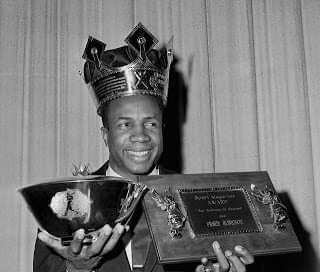The Bird Tapes Interview: Frank Robinson
How he changed the Orioles. Winning a World Series. Getting kneed in the head. Losing a World Series. Managing the "Why Not?" underdogs. The Hall of Famer discusses all that and much more.
Sitting behind his desk in the Oriole manager’s office at Memorial Stadium one day in 1989, Frank Robinson broke into a smile and then laughed out loud.
I was standing on the other side of the desk, asking questions because I needed his comments for a Baltimore Sun column I was about to go upstairs and write in the press box. His laugh halted my questioning.
“What’s so funny?” I asked.
“That’s a good one. Best yet, I’d say,” Robinson said.
I eyed him curiously as he continued to smile. “What are you talking about?” I asked.
“Your pen. Completely chewed up. Best one yet,” he said.
His eyes danced with delight. He was teasing me.
I had been scribbling in a reporter’s notebook as he spoke, using a plastic Bic pen that worked fine despite having seemingly been shattered, as if it’d been stepped on.
Only no one had stepped on it.
In those days, I had the terrible habit of nibbling at the ends of my pens during interviews and while I wrote. There were myriad carcasses to show for it on my desk, in my car, in drawers at home. The worst of them had just been thrown away.
I never stopped to think that the people answering my questions paid the slightest attention. But Robinson, it turned out, was well-versed in my unpleasant habit via our years of interviews.
“You’ve been studying my pens?” I asked.
“How could I not??” he roared. “It’s amazing. There’ve been some others that you got really good. But this one today is the best. Congratulations.”
He was really teasing me.
That was the Frank Robinson I knew — funny, observant, charming. Before I knew the Hall of Fame outfielder, I’d been told he could be standoffish in conversation, even surly, especially if he didn't know you well. I never experienced that.
In 1988, after he became the Orioles’ manager during their season-opening 21-game losing streak, his pregame and postgame sessions with the media were pretty much the sole entertainment. The games were barely watchable (the Orioles lost 108 of them) but Robinson’s gallows humor and wide-ranging observations made it almost tolerable to cover.
A huge Los Angeles Lakers fan, he talked basketball. Football. Movies. The Orioles? We’ve got some issues, you know.
It was a bravura performance, and I’ve always thought the Baseball Gods paid him back for his trouble the next year, when he nearly guided the Orioles to an improbable division title and was named Manager of the Year in the American League.
Ten years later, to interview him for my book on Orioles history, I flew to Arizona, where he was working for the commissioner’s office as the president of the Arizona Fall League, a developmental circuit. We watched a game together in the press box of a small ballpark with the windows open, enabling fans to stand on seats and ask for his autograph. My microcassette recorder ran for more than an hour as I asked him questions about his time with the Orioles as both a player and a manager. Our conversation is my latest Bird Tapes release, accessible below in four parts.
I think I’m safe in saying it’s one of the Bird Tapes’ greatest hits.
Robinson is a towering and pioneering figure in baseball history, a member of the first generation of Black superstars. He also played for the Cincinnati Reds, Los Angeles Dodgers, California Angels and Cleveland Indians, and after becoming the first Black manager in the major leagues, with Cleveland, he also managed the San Francisco Giants, Montreal Expos and Washington Nationals as well as the Orioles. Until his death in 2019, he experienced a long, varied and noble life in the game.
I think his years with the Orioles were his favorites.
The Orioles weren't even really the Orioles until they had Frank Robinson batting third and playing right field starting in 1966. After acquiring him in a trade, they won four pennants and two World Series titles in six years. His acquisition marked the beginning of them having a history that was substantial and indelible.
I wrote about him teasing me about my pens to give listeners a better understanding of our conversation in 1999. It’s casual. We had a history. I’m not sure he was that excited to review his long-ago playing days, great as they were, but he gave me all the time I needed and more than met the moment, speaking freely.
I did NOT chew my pen as we spoke.
Keep reading with a 7-day free trial
Subscribe to The Bird Tapes to keep reading this post and get 7 days of free access to the full post archives.





